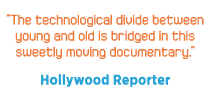I see that “Cyber-Seniors” premiered last week in Toronto, and in Los Angeles and New York City last month. If you have not yet heard of “Cyber-Seniors,” I predict that you will. It is a documentary film which is more than a film. It describes a wonderful new “movement” which seeks to connect the generations by using teenage mentors to help “initially reluctant seniors discover the wonders of the internet.” It is such a good idea, makes perfect sense, and warrants wide attention.
Macaulee and Kascha Cassaday are two sisters from Toronto, 16 and 18 years of age, who helped their grandparents learn to use the computer primarily for email, Skype and Facebook. Their grandparents were delighted. Once they had mastered these basic skills, they could keep in touch with their grandchildren (and vice versa), and follow their activities even though they lived apart.
The Cassadays didn’t stop there. They gathered their friends and conceived the idea that they could be mentors to seniors in retirement homes who had no grandchildren living locally to teach them. For the young people, this mentoring could fulfill their high school requirement for community service. For the seniors, they gained access to contemporary technology. Not just the computer itself but, more importantly, how to use it. The Cassadays and their friends went to one retirement home and met some seniors who were skeptical but prepared to give it a try. Then, they went to another. All the seniors wanted to learn how to use email. Some wanted to learn how to use the internet. Or to plug into Facebook. 89-year-old Shura wanted to make a YouTube video. (How do you make YouTube videos?… I don’t know.)
Older sister, Saffron Cassaday, is a film-maker who shot footage of what was happening between the seniors and their mentors. The stars of the film are the Cyber-Seniors themselves, the youngest 78 years of age, the oldest 93 years, none of whom had ever used a computer before, all who gained the skills they needed to do what they wanted on the internet, and more. The student mentors who helped them cross the generation gap seem delighted with what they and their trainees accomplished. The resulting documentary is totally optimistic, human and heart-warming. Among other things, Shura’s efforts at making a YouTube video prompted a competition among her fellow residents to see who could make the most amusing video, and who could attract the most viewers.
The Cyber-Seniors webpage shows a movie trailer, information about the seniors who have benefited, and details about availability of the film. It is showing at the Carlton in Toronto until June 5th; there are other June dates in the United States and across Canada and, if you want to bring the film to your own community, you can do so through the website. There is also specific information on how everyone can become involved: as Mentors, Cyber-Seniors or Partners. Among other things, they have produced a free Teaching Guide for Mentors and Participant’s Handbook for future Cyber-Seniors. These can be downloaded from the webpage and provide basic instructions for what to do and how to do it. There are addresses for volunteer organizations across Canada and the United States which have shown an interest in the program. They are looking for partnerships in business and in the community to spread the model.
For those of us who believe that older seniors can learn the computer skills necessary to bridge the generation gap, this program fills a huge void. It’s never too late to learn. And who better to teach than young people who know the technology and are keen to share with others? I bet that everyone knows a senior who would benefit, and that every retirement home and care facility in the country could use such a program.
Read this article online here.






